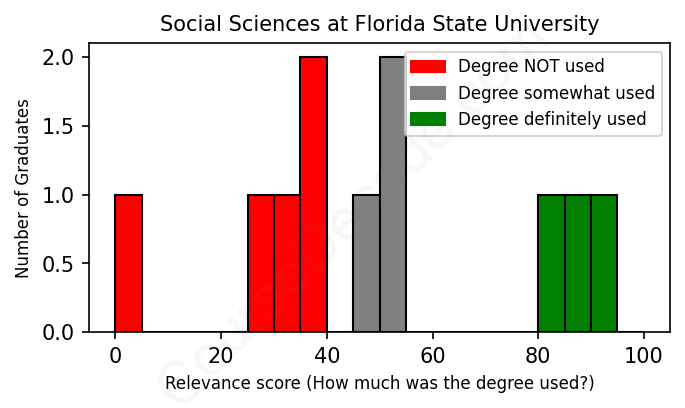
First, some facts. Of the Social Sciences graduates from Florida State University we've analyzed , here's how many have used (or NOT used) their degree in their career:

These are estimates based on AI analysis of 11 LinkedIn profiles (see below).
The verdict? Significantly below average. Overall, with an average relevance score of 49%, Social Sciences graduates from Florida State University have a much lower likelihood (-18%) of finding work in this field compared to the average graduate across all fields:
And for comparison, here's the chart for all profiles we've looked at across all degrees.
Also, after graduating, only 27% of these graduates have pursued further education other than another Bachelor's degree (such as a Masters degree or other), compared to the average across all profiles of 35%. This suggests a Bachelors degree is enough for most Social Sciences graduates, and it's normal to look for work straight after graduation.
See the details:
|
Relevance score: 89% We think this person has gone into a career highly relevant to their degree. We think this person has gone into a career highly relevant to their degree.
DEGREE INFOGraduated in 2015 from Florida State University with a Bachelor of Science - BS in Social Sciences. Also pursued further education since (see below). JOB HISTORY SINCE GRADUATIONLaw Clerk JM Family Enterprises, Inc. May 2016 - Aug 2016 Law Clerk  Perry & Young, P.A. May 2017 - Sep 2018 Congressional Intern  United States Senate Sep 2018 - Dec 2018 Staff Assistant  Office of US Senator Marco Rubio Dec 2018 - Nov 2019 Research Assistant  United States Senate Nov 2019 - Apr 2021 Legislative Assistant  U.S. House of Representatives Apr 2021 - Jan 2023 Legislative Director and Counsel  U.S. House of Representatives Dec 2022 - Apr 2023 Director of Federal Relations  Florida State University Apr 2023 - Present FURTHER DEGREES DONE SINCE GRADUATINGDoctor of Law - JDUniversity of Mississippi School of Law 2015 - 2018 ABOUTNo information provided. |
The top 10 most common jobs done by the graduates we've analyzed (ranked most common to least) are:
After looking through the job experiences of graduates with a Social Sciences degree from Florida State University, it’s clear that many of them end up in roles that are surprisingly diverse. A good chunk of the positions, like legal assistants, law clerks, and various roles in government, align closely with the knowledge you'd expect someone to gain from studying Social Sciences, which covers topics like societal structures, legal frameworks, and human behavior. On the other hand, you also find graduates in completely unrelated fields like retail management, sales, and even as professional athletes. While those jobs might offer opportunities to use some soft skills—like teamwork and communication—they don’t really dig into the academic depth that Social Sciences offer.
Overall, it seems that while there are definitely some strong connections to Social Sciences in certain careers, many graduates find themselves in roles that don’t leverage their degree in a meaningful way. This means that while some are making great use of their Social Sciences knowledge, a lot are drifting into positions where that expertise is just not applicable. So, if you’re considering a path in Social Sciences, it might be helpful to think about how you can channel that knowledge into a career that really benefits from what you’ve learned.
Here is a visual representation of the most common words in job titles for Social Sciences graduates (this is across all Social Sciences graduates we've analyzed, not just those who went to Florida State University):

When looking at the career paths of Social Sciences graduates from Florida State University, it’s clear that they have a mix of experiences, especially in their early careers. A lot of these graduates landed jobs in customer service roles, legal assistance, or even project management immediately after graduation. For instance, some started off as legal assistants or customer service representatives, which makes sense since those positions often allow for soft skill development crucial in the Social Sciences field. However, it’s also noticeable that not everyone stayed true to their degree, with several moving into fields like sales, bartending, and even professional athletics shortly after graduation. This shows that while they have a solid foundation, some graduates might be exploring different paths or simply trying to find their footing in the job market.
Fast forward to about 5 to 10 years later, and there’s a more notable trend emerging. Many alumni appear to find their way back into roles relevant to their studies, like legislative positions for those who interned with government offices or project managers in various sectors. Some graduates transitioned into academia or specialized roles within the legal field, showing career advancement that aligns more with their Social Sciences background over time. Others, however, have taken on roles that stray further away from their degree, suggesting that the initial job market might have led them to explore different interests before possibly reorienting their careers. Overall, while some have definitely succeeded in relevant careers, others appear to be navigating a more winding path that may or may not align with what they studied.
Getting a Bachelor’s degree in Social Sciences at Florida State University—or really anywhere—can be a mixed bag in terms of difficulty. It often depends on what you’re studying specifically; subjects like sociology or psychology can have some tough theoretical stuff, but social sciences are generally considered to be a bit more approachable than, say, engineering or the hard sciences. You’ll do a good bit of reading and writing, which might be challenging if that's not your thing, but a lot of folks find that the topics are really interesting and relatable, making it easier to stay engaged. So, in the grand scheme of things, it’s not the easiest degree out there, but it’s also not one of the hardest—especially if you find the subject matter captivating!
Most commonly, in the LinkedIn profiles we've looked at, it takes people 4 years to finish a Bachelor degree in Social Sciences.
Looking at the job histories of these Florida State University grads, it seems like they’ve had a pretty mixed bag when it comes to making decent money. Some of them, especially those who jumped into legal or corporate roles early on, like the ones working for Alvarez & Marsal or the U.S. House of Representatives, probably snagged some solid paychecks. On the flip side, others went through a bunch of lower-paying jobs before finding their footing, like the one who bounced around food service and retail. So, while many appear to be climbing the financial ladder, others took a longer, winding path, which might’ve meant tighter budgets in their earlier years. Overall, it looks like some are doing well, while others are still figuring things out.
Here is a visual representation of the most common words seen in the "about" section of LinkedIn profiles who have a Bachelor degree in Social Sciences (this is across all Social Sciences graduates we've analyzed, not just those who went to Florida State University). This may or may not be useful:

Here are all colleges offering a Bachelor degree in Social Sciences (ordered by the average relevance score of their Social Sciences graduates, best to worst) where we have analyzed at least 10 of their graduates:
| College | Score | Count |
|---|---|---|
 Portland State University Portland State University
|
72 | 27 |
 University of Maryland University College University of Maryland University College
|
63 | 10 |
 Kansas State University Kansas State University
|
54 | 13 |
 Washington State University Washington State University
|
53 | 11 |
 Ashford University Ashford University
|
51 | 27 |
 Florida State University Florida State University
|
49 | 11 |